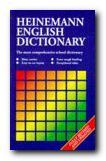popular dictionary – especially useful for schools
My copy of the Heinemann English Dictionary markets itself as “The most comprehensive school dictionary”, but it has been an invaluable companion for many years. First and foremost, it is small enough to pop into a briefcase or even a large handbag – useful when you need to check a word in secret to save face!
 Secondly, the layout is clear and easy to use, helpfully stating the relevant part of speech in full, instead of by abbreviations. I particularly like the way phrasal verbs are set out – if you look up the word pull, each of its variations – pull apart, pull down, pull up and so on – is listed on a separate line, making them much easier to locate. Compound words such as water-hole are shown as separate headings, rather than hidden amongst a myriad of other variations on a word.
Secondly, the layout is clear and easy to use, helpfully stating the relevant part of speech in full, instead of by abbreviations. I particularly like the way phrasal verbs are set out – if you look up the word pull, each of its variations – pull apart, pull down, pull up and so on – is listed on a separate line, making them much easier to locate. Compound words such as water-hole are shown as separate headings, rather than hidden amongst a myriad of other variations on a word.
On a point which may be minor to some (but not to me) it is worth noting that a sans serif font is used for all the header words. This is proven to make words more accessible to beginner readers. As a teacher of Basic Skills to adults, I also appreciate the fact that common errors are pointed out. For example, the definition of the word principal includes a warning not to confuse it with principle. I have not seen this in other dictionaries.
An easily understood ‘pseudo-phonetic’ guide to pronunciation is provided. For example, euphonious is ‘yoo-foe-nee-us’. But, for me, one of its chief strengths is that it not only gives etymological information wherever possible, and an indication of colloquial usage where this may not be clear from the definition or may be useful to non-native speakers of English (eternity -‘It took an eternity for the doctor to arrive’), but that it also adds little titbits of information on selected words.
For example, just browsing through, I discovered that flannel is thought to be one of the few words which English has acquired from the Welsh. As I live in Chester, near the border with Wales, this little gem has opened a number of unexpectedly interesting conversations on linguistics. Nor would I have known, without the aid of these boxes, that the word assassin actually derives from an Arabic word for someone who eats cannabis!
Another surprising finding was the entry for the suffix -ette, for which Suffragette was the first known example. These little boxes are known as ‘Language Study Boxes’ and were designed specifically with the National Curriculum in mind. But who said children have to have all the fun? Incidentally, these extended entries are also provided for all the main parts of speech, giving useful examples for children (and adults) to learn from.
If I have any criticism at all to make, it is simply that my edition is too old, and so lacking in some of the more recent terms in the world of Information Technology – but, frankly, you can forgive an old friend almost anything …
© Alison Trimble 2001
Heinemann English Dictionary, London: Heinemann Educational, 5th edition 2001, pp.1248, ISBN: 0435104241
More on language
More on literary studies
More on writing skills
More on creative writing
More on grammar